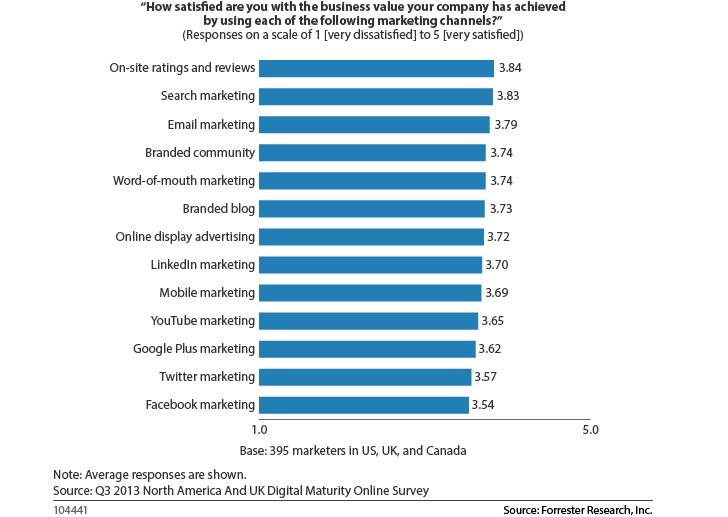A recent survey performed by Forrester and a scathing open letter from Nate Elliott to points to one major and undisputed fact: marketers and businesses are not getting the value they had hoped from Facebook advertising. That much is perfectly clear from the graphic. The reality, however, is that Facebook’s only problem is that many marketers are stuck in the “spam and manipulate” model that simply doesn’t work on Facebook.
Facebook isn’t the one failing anyone, at least in this regard. It should be noted that I have never been the biggest fan of Facebook, what it represents, and in particular what it does with our data. With that said, I find myself reluctantly defending them because the assertions against them are absurd.
The biggest clue to the flawed nature of the premise is in the results themselves. If you were to take an experienced marketer and have them stack-rank the various marketing techniques based on how easily they can be manipulated, spammed, and generally utilized in nefarious ways, the top three would on the Forrester list would be the same that would be on the top of the “spamability” list. Gaming the system for reviews, search marketing, and email marketing are all extremely easy and are the favorites amongst those who are looking for the easy road.
Don’t get me wrong. I’m not condemning the methods or those who game the various systems. Of the three, search is one that I operate in regularly and must combat the gaming of that particular system on a regular basis. The bottom line is that it is simple to get benefits from boosting online reviews, search marketing is getting more challenging but is still pretty easy to manipulate, and email marketing is, for the most part, about trying to provide value while staying within the rules. They are easy and effective.
Further down the list, we see the second clue. LinkedIn marketing is a very niche arena when it comes to effectiveness. The majority of businesses do not and should not be marketing their products through LinkedIn. Marketers themselves, however, find great value in marketing their services through LinkedIn. The fact that this is higher on the list than mobile marketing and YouTube marketing shows that the 395 marketers surveyed were considering their own personal gains from marketing as highly as they were considering their clients’ gains.
The final clue comes in at number 4 on the list. Branded communities, like LinkedIn, are not appropriate for the majority of marketing agencies unless you’re talking about how well they can be used to market the agency’s services. To come in at #4 is ludicrous without the personal gains of the marketers taken into account. If branded communities worked so well, why wouldn’t every flower shop, car dealership, and dental hygienist in North America have one? If Facebook marketing was so bad, why do just about every flower shop, car dealership, and dental hygienist waste their time one it?
Now, let’s take a look at the post by Elliott. In short, he points to two problems that Facebook has with their advertising. He believes that Facebook does not drive genuine engagement and that they do not leverage their social data well enough. The statements are true for most. Facebook has not done enough to teach marketers how to take advantage of the system. However, that doesn’t necessarily mean that it’s Facebook’s fault.
The reason that they aren’t to blame is because tenacious, aggressive marketers are both driving genuine engagement and utilizing the social data that Facebook provides. Facebook’s only fault in this regard is that they do not offer classes to those marketers who are too incompetent to use the instructions that Facebook offers, test the effectiveness of their efforts, and grow based upon using real marketing chops rather than have it waiting for Facebook to devise a road map that they can follow.
Unfortunately for the incompetent, such a road map can never exist. Facebook is a social network. It relies on creativity and manual effort, not automation and templates. For Elliot’s statements to be truly accurate, Facebook would have to teach marketers how to market. It’s a lost art nowadays because of the very advertising venues that are being heralded in the study. Marketers found an easy road to manipulate and spam. Why would they want to actually work for it?
Done properly, social media in general and Facebook in particular is the most cost-effective way to perform true marketing goals. It isn’t a venue that your average internet marketing professional can do well in because it takes an old-school mentality to make it sing. Television advertising executives would probably have an easier time adjusting to the realities of Facebook than a search marketing pro any day. The former knows that creativity and effort supersede automation and manipulation. The latter, which likely accounts for the majority of those surveyed, doesn’t understand the concept of “doing it by hand” or “quality over quantity”. They are looking for a push-button solution. Facebook is not one of those.



GIPHY App Key not set. Please check settings